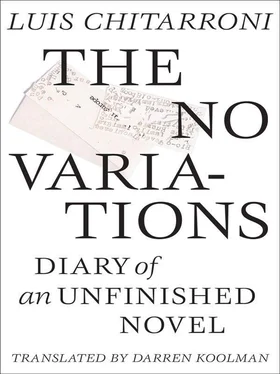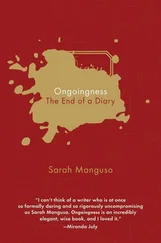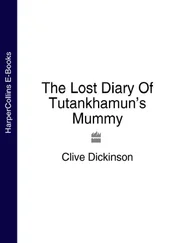Anecdote in “Early” and “Replicas”
Many years later, he was horrified when one of the boys who wrote for the school paper — being alerted by an older boy — referred to him as one who had been “investigating with gloves on.” And he answered: “I’ve never done [carried out] any investigating whatsoever. And that’s not to say I don’t fear infection, [ au contraire , I know all about the terrible diseases one can contract …] and for that reason, I never felt the urge to investigate. I fear the gloves are only used by arrivistes. The seeker doesn’t need to rummage or even touch anything: he need only look in order to see. The spines of books are like tombstones. Even the least discernible ones, those with faded inscriptions, will not escape his notice. And as regards the ones stacked on desks or piled on floors, they are detected, as tiny pebbles in a dense forest, through the gaps between leaves. Even what is imagined, what has never been seen, is anticipated by those spaces that are yet to be filled …”
It was the longest answer he gave, and the most emphatic, for the written questionnaire. He’d even tried to find the first fake editions he’d done [for Frederick Prokosch ( NYRB )] to make the answer more exhaustive.
He came across some publications of Edith Wharton — the ones with those illustrations by Maxfield Parrish she’d rejected …
He looked with familiar disdain on the books from his last trip, still wrapped in a Galigani bag.
He had on his wall a photo of Arthur Waley playing the flute, or something that could be translated “flute” as a penultimate punishment [ reed ]
[And although he was a big fan of Hollywood movies, and especially Westerns, he was cautious about making sweeping generalizations. It’s true he liked Hitchcock, but he felt that when his movies were bad, they were horrid. But the director whose films he really couldn’t stand was Brian de Palma. He far preferred a conventional movie with a strong cast, directed by someone like Adrian Lyne, to some florid art-house adaptation of the Hitch-hiker’s Guide to Europe . He advocated films like Karel Reisz’s Sweet Dreams , because, for one, he loved K. Reisz generally (the first time I saw that particular flick, at an open-air cinema in the provinces, he spent the whole time raving about A Suitable Case for Treatment ), and, for another, because there’s no film that succeeds so well at divesting myths of their splendor, he said: not by censoring them, but through a stripping away of the rich patina of common belief to reveal the underlying pith]
NO
He was raised by two spinster aunts in a large [and cavernous] house in Lobos. The Donados [the Vieytes] [Chola Quaglia: Barriola, Fanfarlo, Arribalo], his FATHER’S sisters, were known for their euphemisms, which although frequently incongruous, seemed to leap from their mouths with such éclat … “part the shutters so Phoebus’s rays can unsettle the Lord’s diadem,” said Soccoro to her younger sister, Milagros, when she wanted her room to feel less like a monastic cell … // “Milagros, narrow the shutter, so Phoebus’s rays can wound …” [Chloe Quaglia, las Barriola] As for the eggs in their henhouse — and eggs in general, for that matter — they were called “homemade abortions.” And Gabriel was content to recall their turns of phrase, the majority of which were taken [extracted] from Don Quixote or the Vulgate … “Either Sancho is dreaming, or Sancho is lying,” is an example, and also “Tomorrow, God will bring back the sun and we will prosper,” and “see you remove the mud from your feathers after swooping on serpents, and if you can, be sure to trim your talons].”
And: “No manna, no manna …”
And, on one occasion, he heard: “Look, here they come … the belfry owls …”
[But] he had a good childhood, thanks to his orphancy, and he has many fond memories of playing outdoors with other children, or alone in the garden with bugs — earthworms, beetles, and smoking toads. And if the world was made up entirely of earthworms, Doctor Natchez once said to him, it would suit him to the ground [find in Book of Merlyn ]. When he hung out with other boys, they were either at school or bathing in the lagoon. One time, the bonetudos stole their clothes from the branches of the trees that circled the lagoon. It was on a sunny afternoon in November, before classes had finished. A surprise attack, for no one expected the bonetudos to be on duty until later.
There were [public] outrages committed behind the carnival mask. And indeed, it was a grotesquery of disguises — tall hats, stilts, shiny pants, and feathered masks — that ensured the malefactor’s anonymity. For the carnival time is when small offences are forgiven, crimes encouraged, and outrages lavishly rewarded. [At sixteen, he was very precocious,] The foregoing was about Firpo. The brisk night air was riven by howling. But he vowed to stay silent, and he did .
Before going to study in La Plata, Gabriel got to know the first and last names of some of the bonetudos. It was one of the most astounding discoveries he’d made in his life up to that time; but after two months in the city, it seemed the most banal. How strange it is to live at the mercy of time: before he died, and just before he found the Forbes Mallacombe edition of the Progresse of Sicknesse in Rubio (bookstore), GD recalled the name of the boy who found the clothes (it didn’t matter that they weren’t his clothes) close to Fiñuqui’s property, nearly two miles away from the lagoon. Finnucan [ surname ].
When he got back to the house, the Donados …
Three days later (so begins the anecdote), on Holy Thursday [?], Gabriel went with Socorro to the market to lend a hand. The market … “maritime or fluvial?” enquired his tutor. And Gabriel recognized the voice of his benefactor [masked, lacunar] hoarse after shouting from the kiosk: “twenty for a pair.” She was his first love.
At his fiancée’s insistence, he went to see a psychologist. “Your motivation is your salary.” Adelaida’s suitor had given her a gift of stamps ( Antigua, penny, puce ). In El Carapálida ’s lycergical glossary (I forgot the codes), Patrick Hamilton and the postage stamps they gave him
Suite of names
Wanda Landowska. Conlon Nancarrow.
Vivant Denom. Bonomy Dobrée.
Include the scene in A. de Mayo’s bookstore.
He couldn’t think about them without remembering a certain epistle of Lope’s, and he couldn’t think about this without being reminded of Lugones’s poem, “The Old Bachelor.” He’d pocketed these anecdotes in order to share them with others he confided in, the people he most wanted to impress. He’d repeat them frequently to those who’d already heard them, but in changing certain details here and there, his interlocutors got the impression they were hearing them for the very first time
In the town, Pondal [Pividal] used to call them “belfry owls”
Until he was sixteen, he never went a day without seeing them. After he left, he only returned home after hearing of Alina’s death, which happened the same spring he went to study in La Plata. They died in the order they were born, although Lourde’s sickliness seemed an omen of her passing not long after. They bequeathed to him many memories and stories, but also a strange uneasiness he always felt while he was living in the house, which others felt as well while under that roof: a feeling each of them provoked, and which was only enhanced when the two were together.
(…) In the period before he left, when he was at the cusp of adolescence, Lourdes used to request it whenever she was in the shower. He’d gotten used to seeing his guardian through the frosted glass partition, but he’d yet to grow weary of seeing her youthful body. When she knocked on the glass screen, he understood it as a request to regulate the water heater. Once, she drew the screen too soon and he was able to catch a full-on glimpse of her for the very first time. Her body looked more youthful in the vaporous brisk air than it did through the opaque barrier. She seemed flawless, her skin, a marmoreal pallor rarely violated by the sun. And although the image lasted but a second’s glance, a glance he tactfully removed before she felt it, it left an impress on his mind he never lost.
Читать дальше












